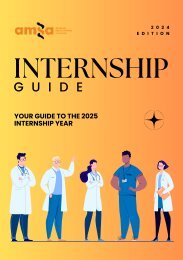The 2022 Starting Med Guide
Time truly flies. It's 2022, and we're welcoming another cohort of first-year students to medical schools across Australia. On behalf of your AMSA, we are so happy to have you! Throughout your degree, AMSA is here to support you at every turn. Whether you have a passion for advocacy or policy, global, rural, Indigenous or queer health, medical education, mental health, gender equity, national and international health politics, leadership, events or community, you will find opportunity for growth and discovery within AMSA. We understand that starting medicine can be daunting, and so our team has put together this guide to help you along the way. Enclosed within are tips and tricks, academic and study, career and networking advice, and available crisis and non-urgent support services.
Time truly flies. It's 2022, and we're welcoming another cohort of first-year students to medical schools across Australia.
On behalf of your AMSA, we are so happy to have you! Throughout your degree, AMSA is here to support you at every turn. Whether you have a passion for advocacy or policy, global, rural, Indigenous or queer health, medical education, mental health, gender equity, national and international health politics, leadership, events or community, you will find opportunity for growth and discovery within AMSA.
We understand that starting medicine can be daunting, and so our team has put together this guide to help you along the way. Enclosed within are tips and tricks, academic and study, career and networking advice, and available crisis and non-urgent support services.
Create successful ePaper yourself
Turn your PDF publications into a flip-book with our unique Google optimized e-Paper software.
Academic Resources<br />
<strong>Starting</strong> medical school from an academic standpoint is scary. With seemingly endless medical<br />
databases, journals and libraries, it can be hard to know where to start. However, as you start to<br />
sift the diamonds from the rough when you start your degree, searching for information becomes<br />
easier and easier.<br />
Your first year of medical school is the perfect time for you to get familiar with popular and niche<br />
resources and see exactly what works for you. Do you prefer reading or watching information? Do<br />
you need those extra questions and quizzes to ensure that you are as confident as you can be in<br />
that semester final? <strong>The</strong>se are all questions you can start answering now through trial and error.<br />
Trust that you will adapt as your course goes on and you find your study groove. To help you<br />
along, AMSA has compiled a short list of resources that may provide a good starting point for<br />
you.<br />
Books<br />
Textbooks are a very traditional resource for academic information and can be a fantastic way to<br />
gain a foundational understanding of course content. It is, generally speaking, not necessary to<br />
purchase textbooks before you have started medical school unless you have been specifically<br />
told to by your university. Textbooks can be an expensive investment, and you may find that you<br />
often find cheaper alternatives once you start university (such as borrowing them from your<br />
university library or obtaining them from older year groups). Consider your learning style and work<br />
out whether purchasing the brand new $150 textbooks each semester is really a good<br />
investment. <strong>The</strong>re are hundreds of free online interactive learning tools, and many Unis and<br />
<strong>Med</strong>Socs will have content databases where you can access digital or online copies of textbooks<br />
for FREE. If you are someone that works well with textbooks then consider a second-hand copy.<br />
Humans have been studying the body and medicine for centuries so nothing in the updated 8th<br />
edition of that shiny anatomy textbook is really going to make or break your exam results. That<br />
said, here are some textbooks that many students use in their foundational (and even later) years.<br />
Talley and O’Connor’s Clinical Examination<br />
Comprehensive explanation of clinical examination and medicine. An excellent Australian<br />
resource for the entirety of medical training.<br />
Tortora’s Principles of Anatomy & Physiology<br />
A basic but easy-to-read textbook that is perfect for understanding pre-clinical year anatomy and<br />
physiology foundations.<br />
Guyton and Hall’s Textbook of <strong>Med</strong>ical Physiology<br />
A more comprehensive textbook for medical physiology that also has an accompanying question<br />
booklet.<br />
Netter’s Anatomy Flashcards<br />
A great starting resource for first year students to learn and retain basic anatomy.<br />
<br />
31

















